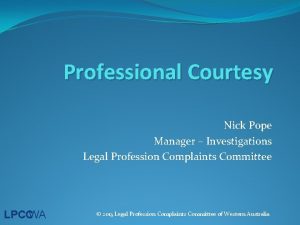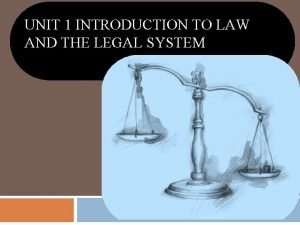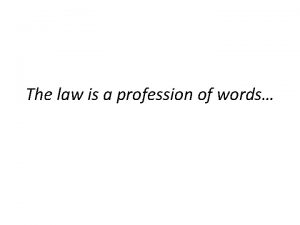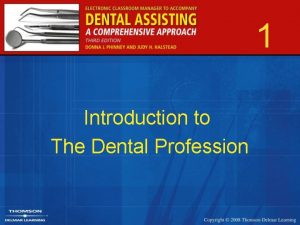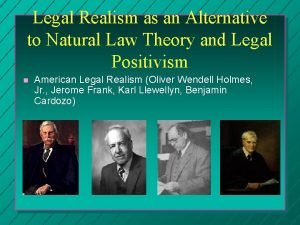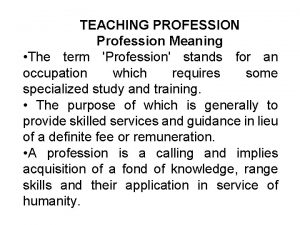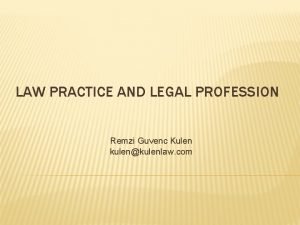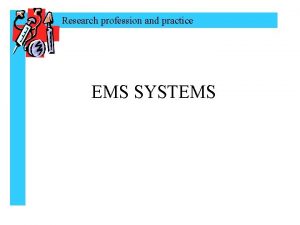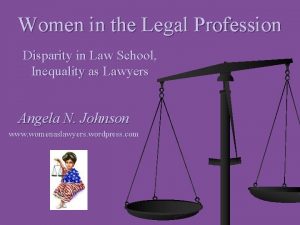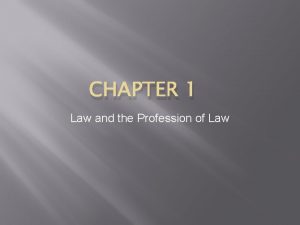LAW 101 Introduction to the Legal Profession and















- Slides: 15

LAW 101 – Introduction to the Legal Profession and Legal Ethics Tennessee Supreme Court Rule 8

n Rule 1. 1 COMPETENCE A lawyer shall provide competent representation to a client. Competent representation requires the legal knowledge, skill, thoroughness, and preparation reasonably necessary for the representation.

n Rule 1. 2 SCOPE OF THE REPRESENTATION AND THE ALLOCATION OF AUTHORITY BETWEEN THE LAWYER AND CLIENT (a) Subject to paragraphs (c) and (d), a lawyer shall abide by a client’s decisions concerning the objectives of the representation and may take such action on behalf of the client as is impliedly authorized to carry out the representation. A lawyer shall abide by a client’s decision whether to settle a matter. In a criminal case, the lawyer shall abide by the client’s decision as to a plea to be entered, whether to waive jury trial, and whether the client will testify. (d) A lawyer shall not counsel a client to engage, or assist a client, in conduct that the lawyer knows or reasonably should know is criminal or fraudulent, but a lawyer may discuss the legal consequences of any proposed course of conduct with a client and may counsel or assist a client to make a good faith effort to determine the validity, scope, meaning, or application of the law.

n Rule 1. 3 DILIGENCE A lawyer shall act with reasonable diligence and promptness in representing a client.

n Rule 1. 4 COMMUNICATION (a) A lawyer shall keep a client reasonably informed about the status of a matter and comply with reasonable requests for information within a reasonable time. (b) A lawyer shall explain a matter to the extent reasonably necessary to permit the client to make informed decisions regarding the representation.

n Rule 1. 5 FEES (a) A lawyer’s fee and charges for expenses shall be reasonable. The factors to be considered in determining the reasonableness of a fee include the following: (1) the time and labor required, (2) the likelihood, that the acceptance of the particular employment will preclude other employment by the lawyer; (3) the fee customarily charged in the locality for similar legal services; (4) the amount involved and the results obtained; (5) the time limitations imposed by the client or by the circumstances; (6) length of the professional relationship with the client; (7) the experience, reputation, and ability of the lawyer (8) whether the fee is fixed or contingent; (9) prior advertisements or statements by the lawyer with respect to the fees the lawyer charges; and (10) whether the fee agreement is in writing.

n Con’t (d) A lawyer shall not enter into an arrangement for, charge, or collect: (1) any fee in a domestic relations matter, the payment or amount of which is contingent upon the securing of a divorce or the award of custodial rights, or upon the amount of alimony or support, or the value of a property division or settlement, unless the matter relates solely to the collection of arrearages in alimony or child support or the enforcement of an order dividing the marital estate and the fee arrangement is disclosed to the court; or (2) a contingent fee for representing a defendant in a criminal case.

n Rule 1. 6 CONFIDENTIALITY (a) Except as provided below, a lawyer shall not reveal information relating to the representation of a client unless the client consents after consultation, except that the lawyer may make such disclosures as are impliedly authorized by the client in order for the lawyer to carry out the representation. [Amended by order filed April 29, 2003. ]

(b) A lawyer may reveal information relating to the representation of a client to the extent the lawyer reasonably believes disclosure is necessary: (1) to prevent the client or another person from committing a crime, including a crime that is reasonably certain to result in substantial injury to the financial interest or property of another, unless disclosure is prohibited or restricted by RPC 3. 3; (2) to secure legal advice about the lawyer’s compliance with these Rules; or (3) to establish a claim or defense on behalf of the lawyer in a controversy between the lawyer and the client, to establish a defense to a criminal charge or civil claim against the lawyer based upon conduct in which the client was involved, or to respond to allegations in any proceeding concerning the lawyer’s representation of the client.

(c) A lawyer shall reveal information relating to the representation of a client to the extent the lawyer reasonably believes disclosure is necessary: (1) to prevent reasonably certain death or substantial bodily harm; (2) to comply with an order of a tribunal requiring disclosure, but only if ordered to do so by the tribunal after the lawyer has asserted on behalf of the client all nonfrivolous claims that the information sought by the tribunal is protected against disclosure by the attorney- client privilege or other applicable law

n Rule 1. 7 CONFLICT OF INTEREST: GENERAL RULE (a) A lawyer shall not represent a client if the representation of that client will be directly adverse to another client, unless: (1) the lawyer reasonably believes the representation will not adversely affect the relationship with the other client; and (2) each client consents in writing after consultation. (c) A lawyer shall not represent more than one client in the same criminal case, unless (1) the lawyer demonstrates to the tribunal that good cause exists to believe that no conflict of interest prohibited under this Rule presently exists or is likely to exist; and (2) each client consents in writing after consultation concerning the implications of the common representation, along with the advantages and risks involved.

n Rule 1. 8 CONFLICT OF INTEREST: PROHIBITED TRANSACTIONS (a) A lawyer shall not enter into a business transaction with a client or knowingly acquire an ownership, possessory, security or other pecuniary interest adverse to a client unless: (1) the transaction and terms on which the lawyer acquires the interest are fair and reasonable to the client and are fully disclosed and transmitted in writing to the client in a manner that can be reasonably understood by the client; and (2) the client is given a reasonable opportunity to seek the advice of independent counsel in the transaction; and (3) the client consents thereto in a writing signed by the client.

n Rule 1. 9 CONFLICT OF INTEREST: FORMER CLIENT (a) A lawyer who has formerly represented a client in a matter shall not thereafter represent another person in the same or a substantially related matter in which that person’s interests are materially adverse to the interests of the former client, unless the former client consents in writing after consultation.

n Rule 1. 10 IMPUTED DISQUALIFICATION: GENERAL RULE (a) Except as permitted by paragraph (c), while lawyers are associated in a firm, none of them shall knowingly represent a client when any one of them practicing alone would be prohibited from doing so by RPC 1. 7, 1. 8(c), 1. 9(a), 1. 9(b), or 2. 2.

n Rule 1. 15 SAFEKEEPING PROPERTY (a) A lawyer shall hold property and funds of clients or third persons that are in a lawyer’s possession in connection with a representation separate from the lawyer’s own property and funds. A lawyer in possession of clients’ or third persons’ property and funds incidental to representation shall hold said property and funds separate from the lawyer’s own property and funds.
 Vimeforum
Vimeforum Unit 1 introduction to law and the legal system
Unit 1 introduction to law and the legal system Newton's first law and second law and third law
Newton's first law and second law and third law Newton's first law
Newton's first law Law is a profession of words
Law is a profession of words Vimeforum
Vimeforum Chapter 1 introduction to the dental profession
Chapter 1 introduction to the dental profession Boyles law
Boyles law Constant of avogadro's law
Constant of avogadro's law Natural law vs positive law
Natural law vs positive law Legal aid townsville
Legal aid townsville Profession you would like to choose
Profession you would like to choose Research about teaching as a vocation and mission
Research about teaching as a vocation and mission E
E Article 7 school officials teachers and other personnel
Article 7 school officials teachers and other personnel Issues and ethics in the helping profession
Issues and ethics in the helping profession
